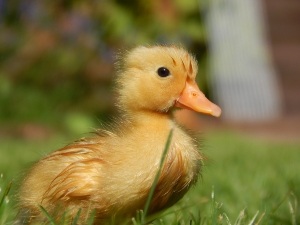
Ducklings can suffer from various conditions, some of which can be fatal to the bird. It is important to know the signs of these conditions so you can quickly and efficiently treat your bird and get it back to good health.
One of the conditions that can be dangerous to a duckling is water logging, but what is water logging? and what are the symptoms? This article looks into it.
Table of Contents
Waterlogged Duckling Symptoms:
Ducklings can quickly become waterlogged, this condition can be very dangerous to the bird, here is what you need to know about this conditions in ducklings:
What is “Waterlogged”
To understand what waterlogging is, we must first understand what preening is and why it is important
Preening is an important part of a bird’s maintenance routine. When ducks preen, they spread onto their feathers the oil that they produce by their preen gland. This makes the bird’s feathers waterproof.
Domesticated ducklings can only swim with no assistance at 5 weeks, old, this is when they start preening themselves and become waterproof. If they swim before this they can become waterlogged.
Waterlogging is a serious condition that occurs when a duckling’s feathers get wet and soaked. The bird becomes chilled when wet because the bird is unable to dry itself after its been in water.
If the bird is left in a body of water, and its wings are soaked, then the bird can drown.
Symptoms of Waterlogged Ducklings:
A Cold Duck
Waterlogged ducklings can be recognized by their coldness.
This is because when the bird’s feathers become wet and stay wet, they lose a lot of their insulation power. This leaves the bird feeling cold. In severe cases, it may lead to hypothermia.
Soaked Wings
Feathers that are waterlogged will soak up moisture, this causes them to become soaked, heavy, and soggy.
The soaked wings make it difficult for ducklings to fly or swim, and this makes them vulnerable to predators as they can be easily caught and eaten. In addition, a duckling’s wet wings also make the bird more susceptible to drowning.
Shivering
Shivering is one of the symptoms of a waterlogged duckling. Shivering happens when a duckling’s body temperature drops below normal levels.
Ducklings, when cold, will shiver in an attempt to get their bodies to warm up. Shivering produces energy that gives off heat and helps them stay somewhat warm.
Other signs of a waterlogged duckling
If your duckling is huddled in a ball, and if its feathers are soggy and heavy looking, then the bird may be waterlogged.
If the feathers on the bird’s head or backside are standing up in a clump, this can also mean that your bird is waterlogged. Other symptoms of a waterlogged duckling include lethargy, slow breathing, drowsiness, sunken eyes, and pale skin.
Waterlogged duckling feathers are limp and sparse instead of fluffy as a healthy duckling’s feathers should be.
The feathers on the backs of the duckling’s tail will likely also feel wet, heavy, and clumpy–if you touch the feathers with your fingers, you’ll notice that they’re not as soft as they should be.
What to do if a duckling is waterlogged?
If your duckling is waterlogged the first thing you need to do is get them away from bodies of water and keep them away from areas that may result in them getting wet, such as ponds or standing water.
Hold the duckling in your hands keeping them warm until you can get them inside. Once inside get them near a heat source to warm up while still in your hands. Do this until the shivering becomes less.
Run a warm bath for the birds, around duckling body temperature, and let them swim in there to get rid of any gunk that may be stuck to them.
Towel dry the bird after the bath and wrap them in a dry towel. Check the feathers for wetness and dry out any that are still damp.
Hold them until they are done shivering and then place them in their brood box under a heat lamp. Leave them in this safe, isolated warm area.
Do not use hot air blowers on the bird as this can lead to burns.
If you enjoyed this article then you may also be interested in other duck related articles. Here are some articles that you may be interested in: Waterlogged Duckling, How To Clean Duck Poop From Grass, How To Train Ducks To Go In At Night, Duckling Hatched Too Early,

